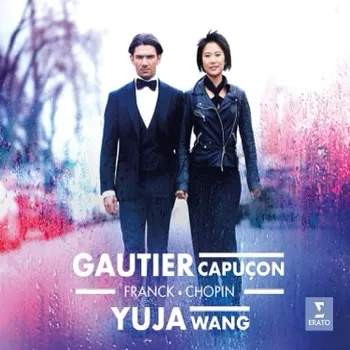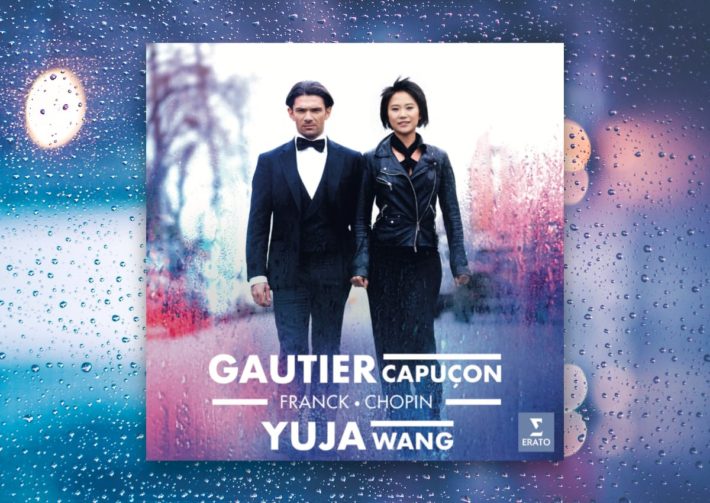Yuga Wang and Gautier Capuçon play César Franck’s Violin Sonata in its most commonly used transcription for cello and piano, by Jules Delsart. There are some lovely performances of this arrangement in the catalog (some are mentioned below), but there is a major issue in this version, a view of the piece which can feel one dimensional in sound and character.

This is particularly salient in the first movement. While Capuçon’s melodies are charming from the opening, they somehow lack an inviting sensitivity, far removed from Micha Maisky, who expresses the beautiful subtleties of this movement in his celebrated version with Martha Argerich (DG, 2000). Maisky takes more liberties with the ebb and flow of the tempo without losing the movement’s intriguingly whimsical quality.
Coloristic changes that can mirror unexpected harmonic shifts are occasionally absent in the new recording (0’42”), and it is only about a minute and a half in that we get a taste of the cellist’s excellent tone control. More of these moments, along with better large scale phrase contouring, would have given life to the movement.
The second movement is probably the strongest of this performance. Wang and Capuçon capture its vitality and urgent spirit. The cellist’s lines are passionate and arresting, while Wang has a virtuosity that adds to the dramatic interpretation. One qualm, however, is that the extremely fast tempo causes the cello melody to be masked by the accompaniment, and the subsequent parallel connection between the piano and cello lines is somewhat lost. Despite this, the movement has a multidimensional character. In the contemplative middle section, there is a good sense of stylistic integration, and Capuçon’s lyricism comes through, bolstered by Wang’s lovely sound quality.
The famous fourth movement has color and fluidity which lacked in the first. It could have been a touch faster, however, and I wasn’t entirely convinced by Capuçon’s portamento at the critical high points of the movement (4’00” and 4’43”). The phrases here could also benefit from slower vibrato, so that the cello sounds less shrill at such a high register. Yo-Yo Ma presents this section very well in his version with Kathryn Stott (Sony Classical, 2003), producing a powerful yet round and full sound.
Arriving at the Chopin Cello Sonata, similar issues emerge. The first movement’s piano introduction would have sounded scintillating if not for the overpedaling of the descending run (for a combination of clarity and mysteriousness in this opening turn to Maria João Pires). Capuçon’s melody is refined but could better use the richness of the instrument’s lower register, as one might hear in du Pré’s recording with Barenboim (EMI, 1971). du Pré’s sound has a fullness of sound, highlighted by the subtle slides and inflections that capture Chopin’s singing qualities. Similarly in the third movement, both Capuçon and Wang’s melodies are gentle but barely scratches the surface. As in the Franck, the faster movements are more engaging; Both the second and fourth movements have good clarity and vitality, all while maintaining Chopin’s signature elegance of writing.
The single-movement works on the album are a nice addition. Chopin’s “Introduction et Polonaise Brillante” puts Wang’s technique and sparkling clarity at the forefront. Capuçon’s lines can use more presence overall, but he does embody the spirit of the Polonaise. Piazzolla’s “Grand Tango” presents a technical challenge for each instrument, and finds Wang and Capuçon at their finest, embodying the quintessential spirit of a tango. There is a broad spectrum of sentiments, ranging from fiery to romantic to gritty; Capuçon’s bowing is precise in the highly rhythmic sections, his phrasing sustained and vibrato-rich in the more melodic ones. The only shame is that there are a few moments where the sound balance between the two instruments is off. And indeed, the sound engineering overall in this release is not the best. There seems to be a strange inconsistency, where the piano sounds warm and close but the cello thin and far away. This sadly undermines both performers’ efforts on an album of technically and musically demanding works.
Franck – Violin Sonata (transcr. Jules Delsart for cello & piano)
Chopin – Cello Sonata, Introduction and Polonaise brillante
Piazzolla – Le Grand Tango
Gautier Capuçon – Cello
Yuja Wang – Piano
Warner Classics, CD 190295392260




















